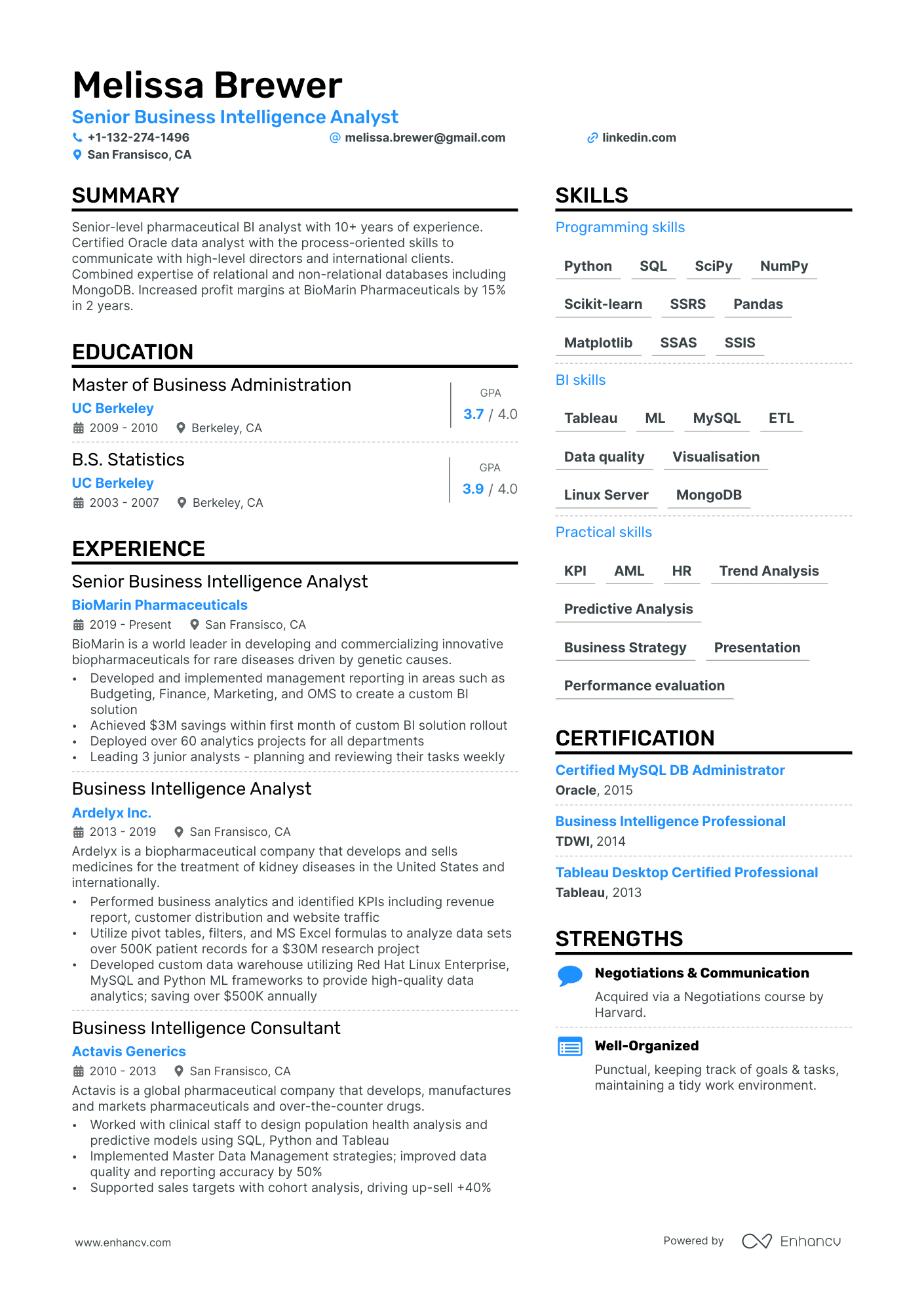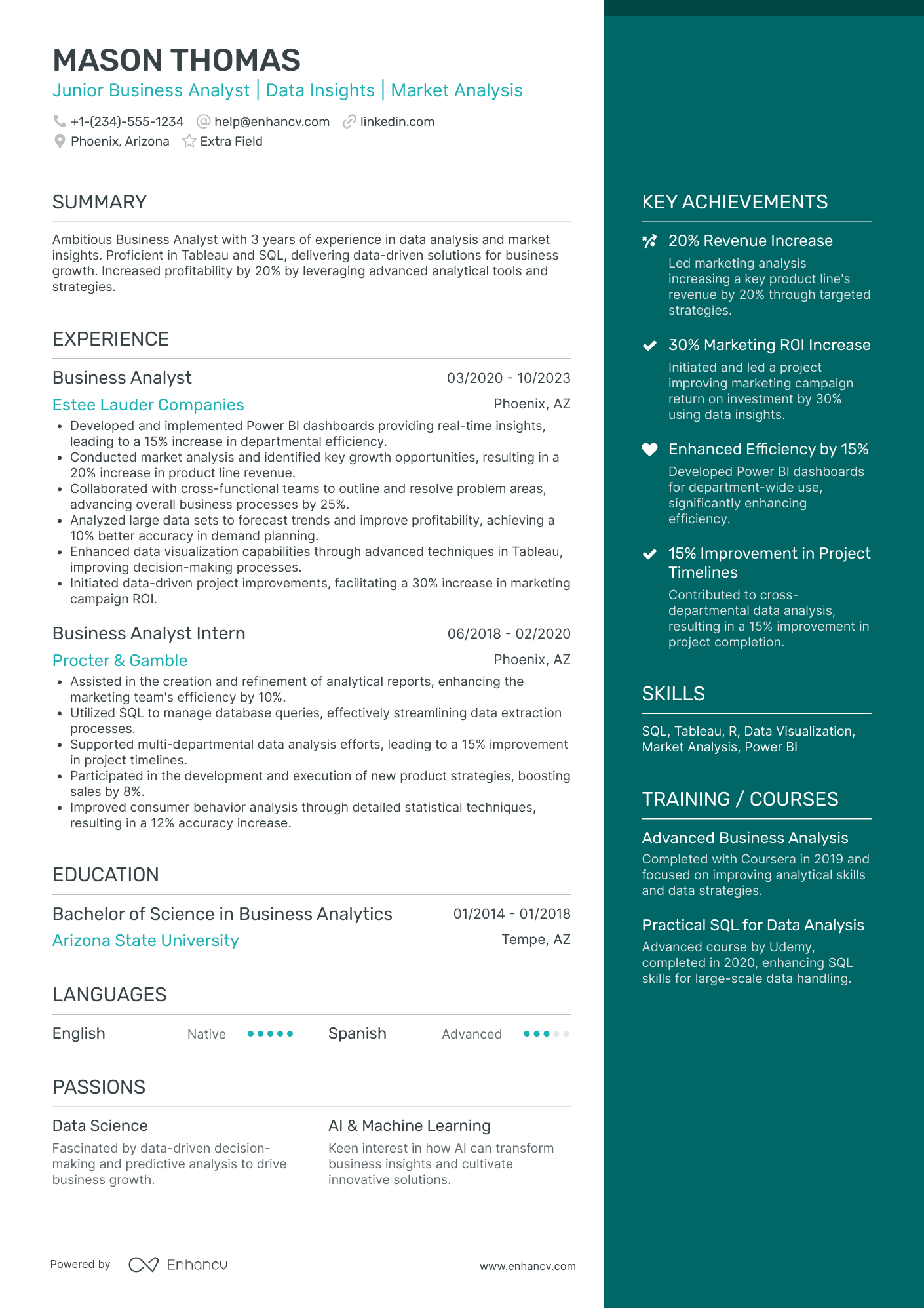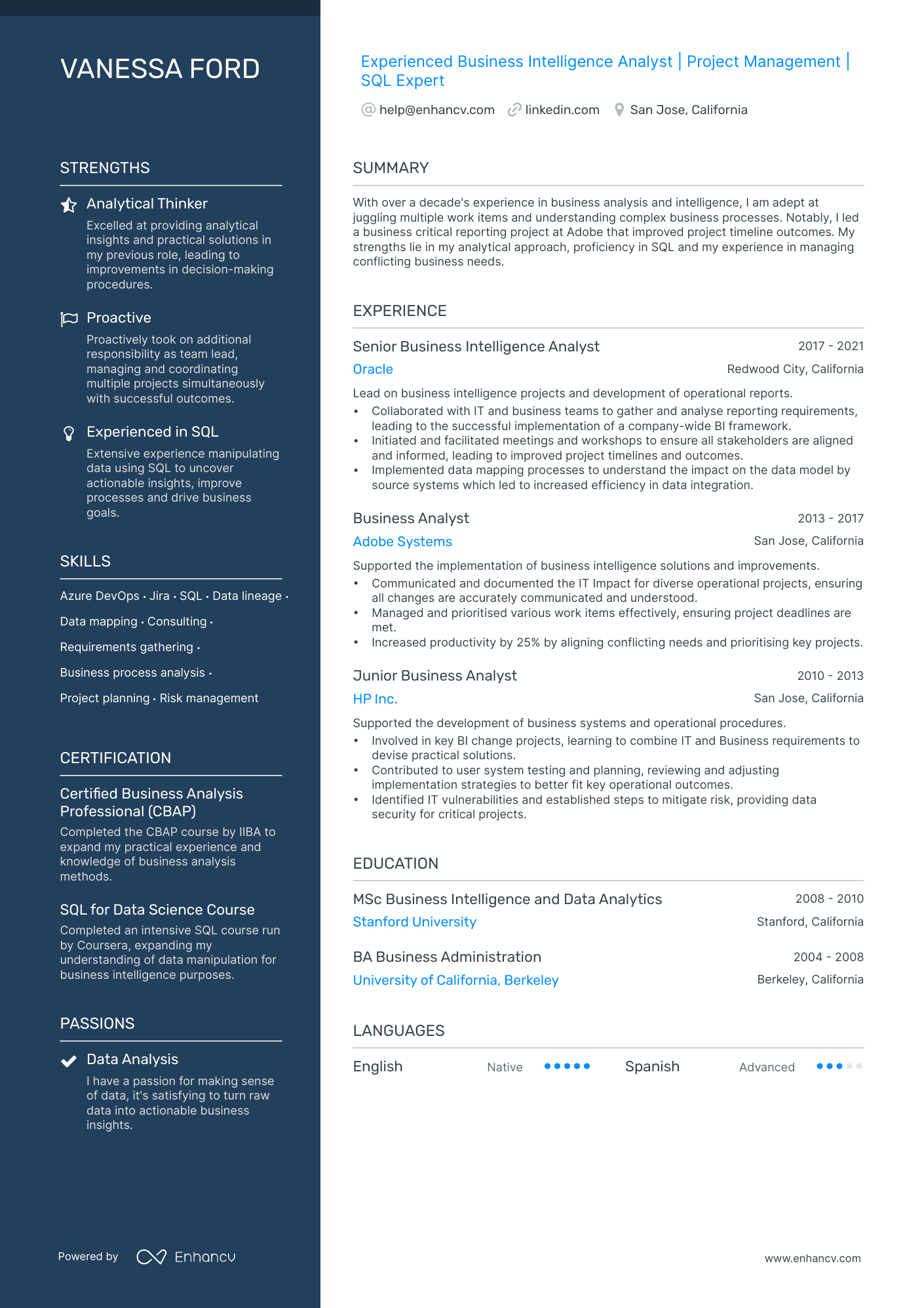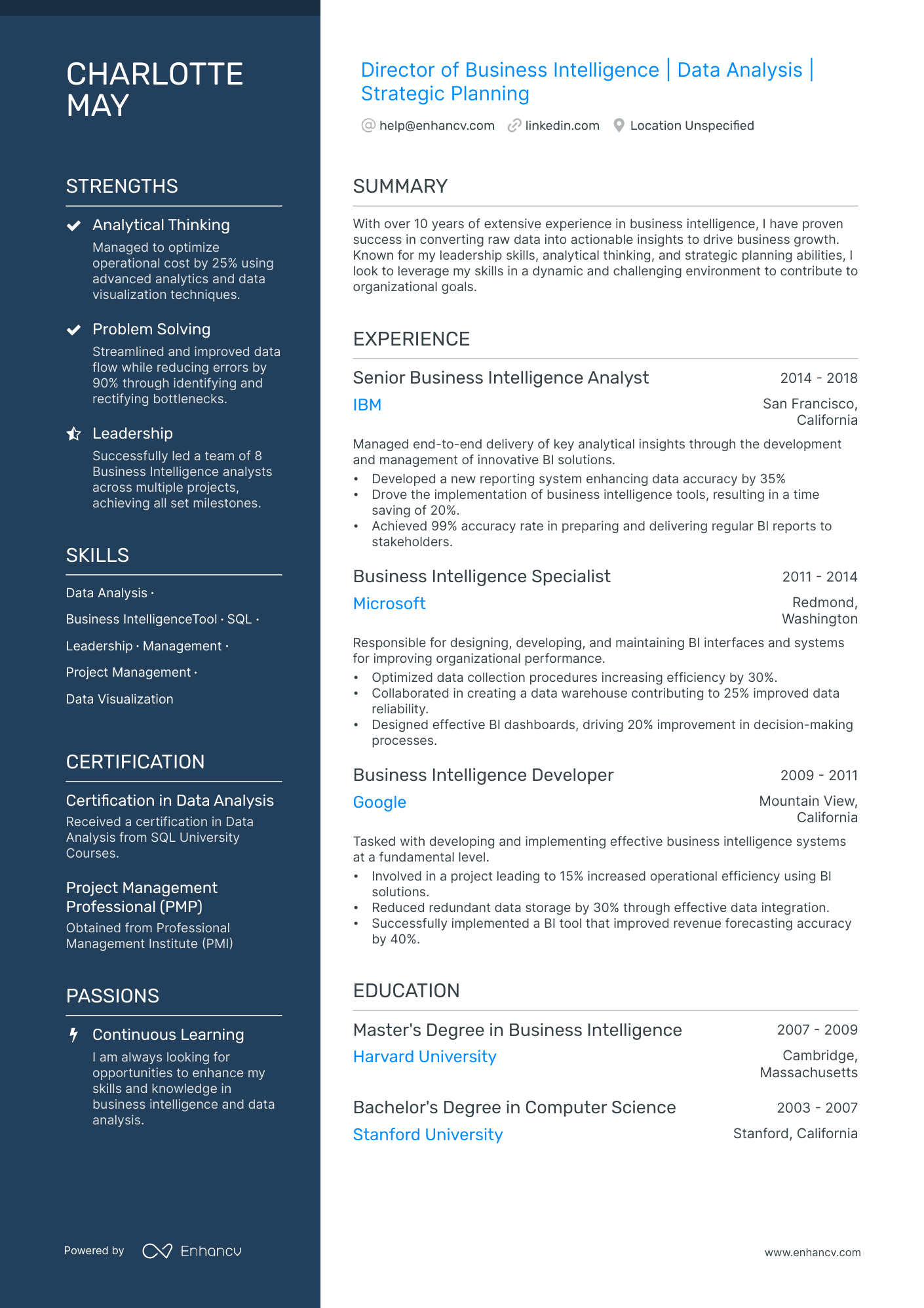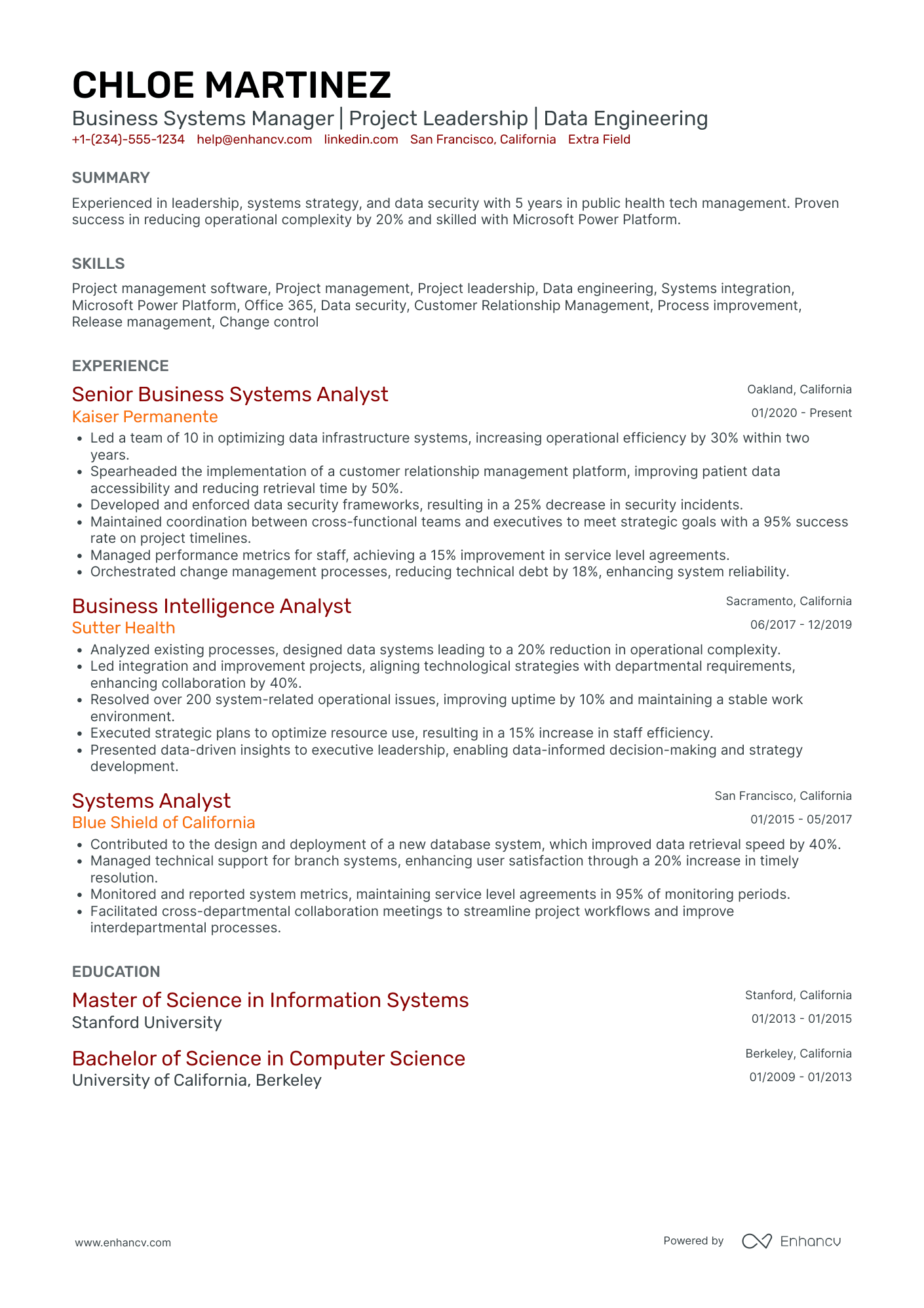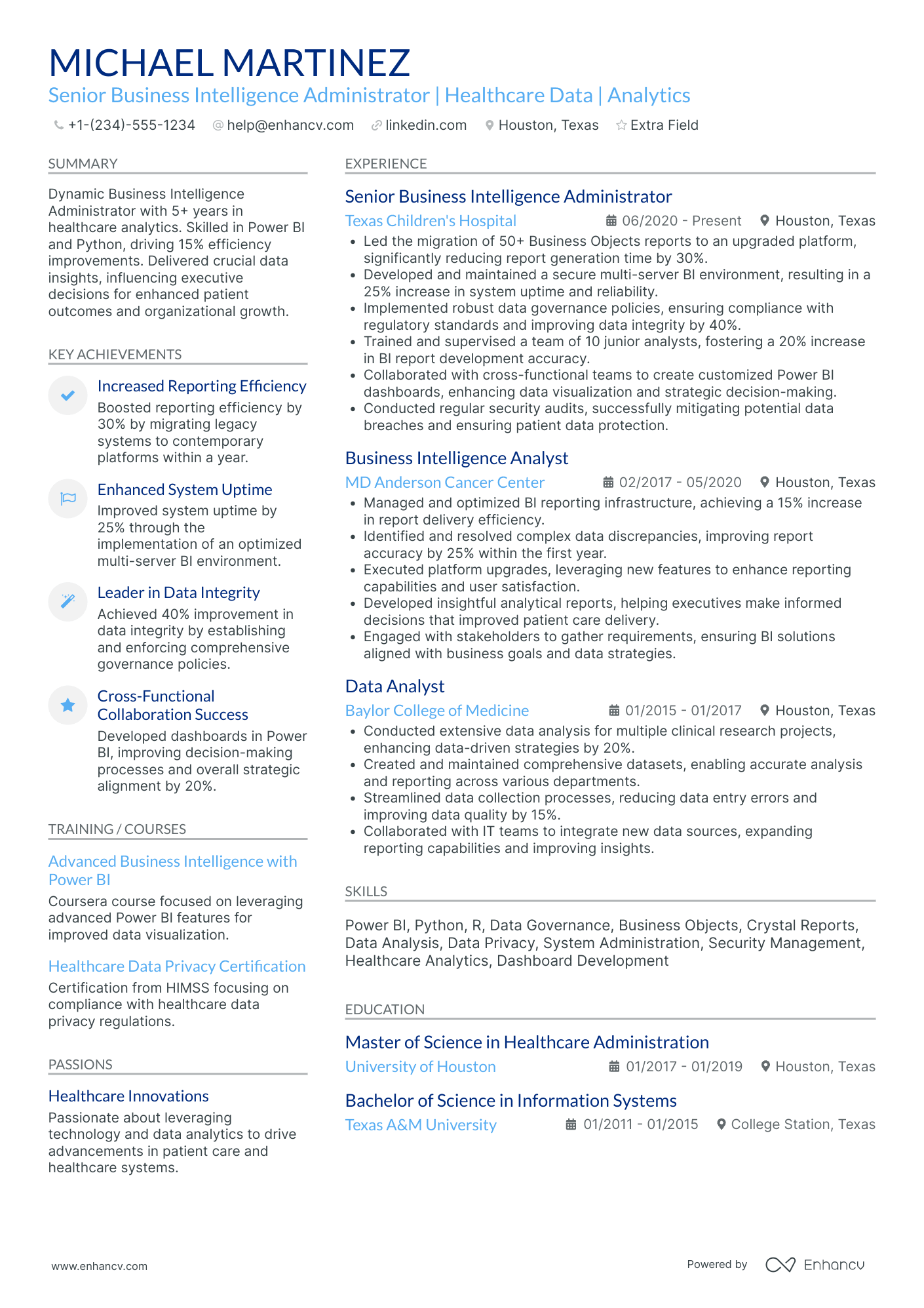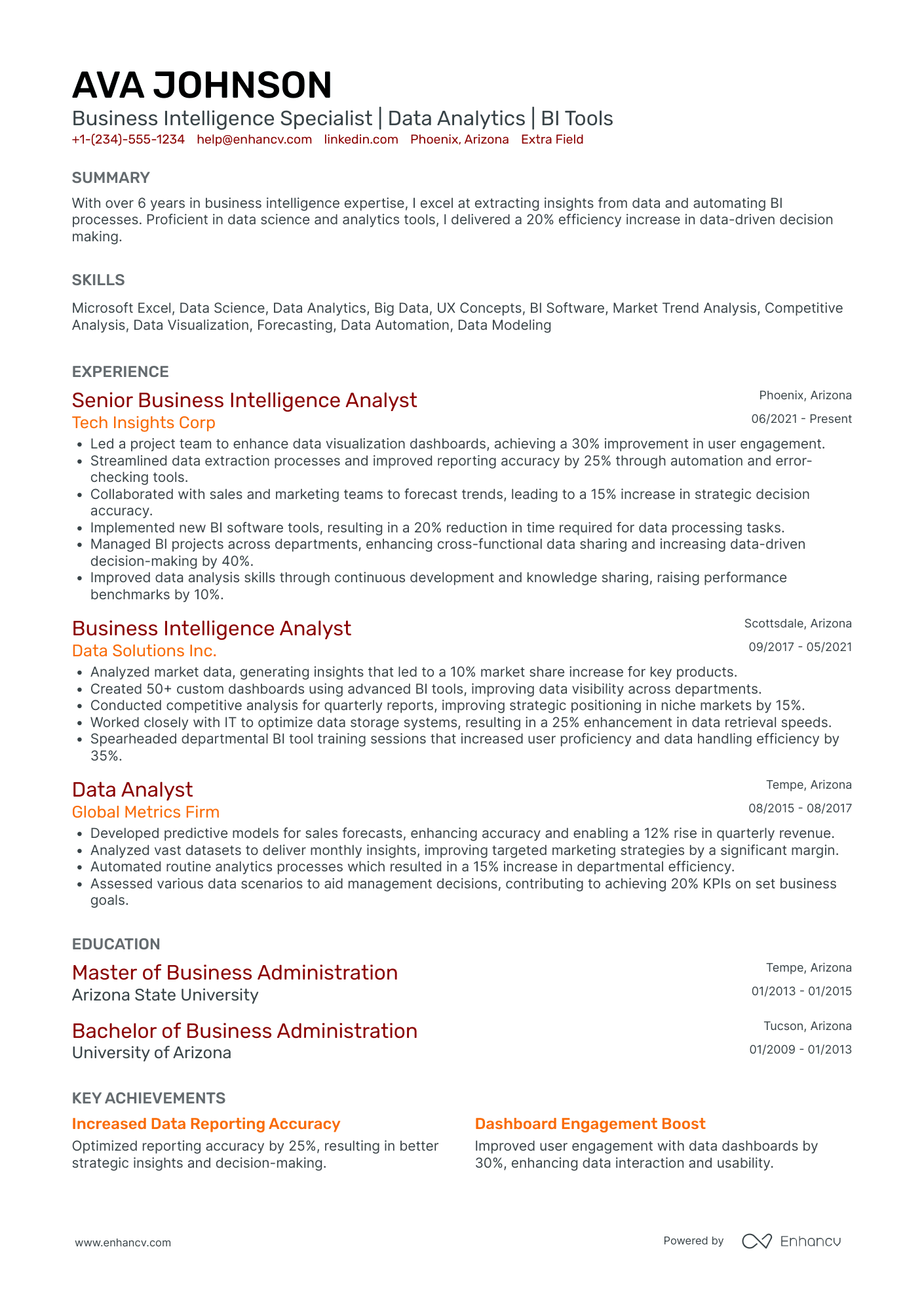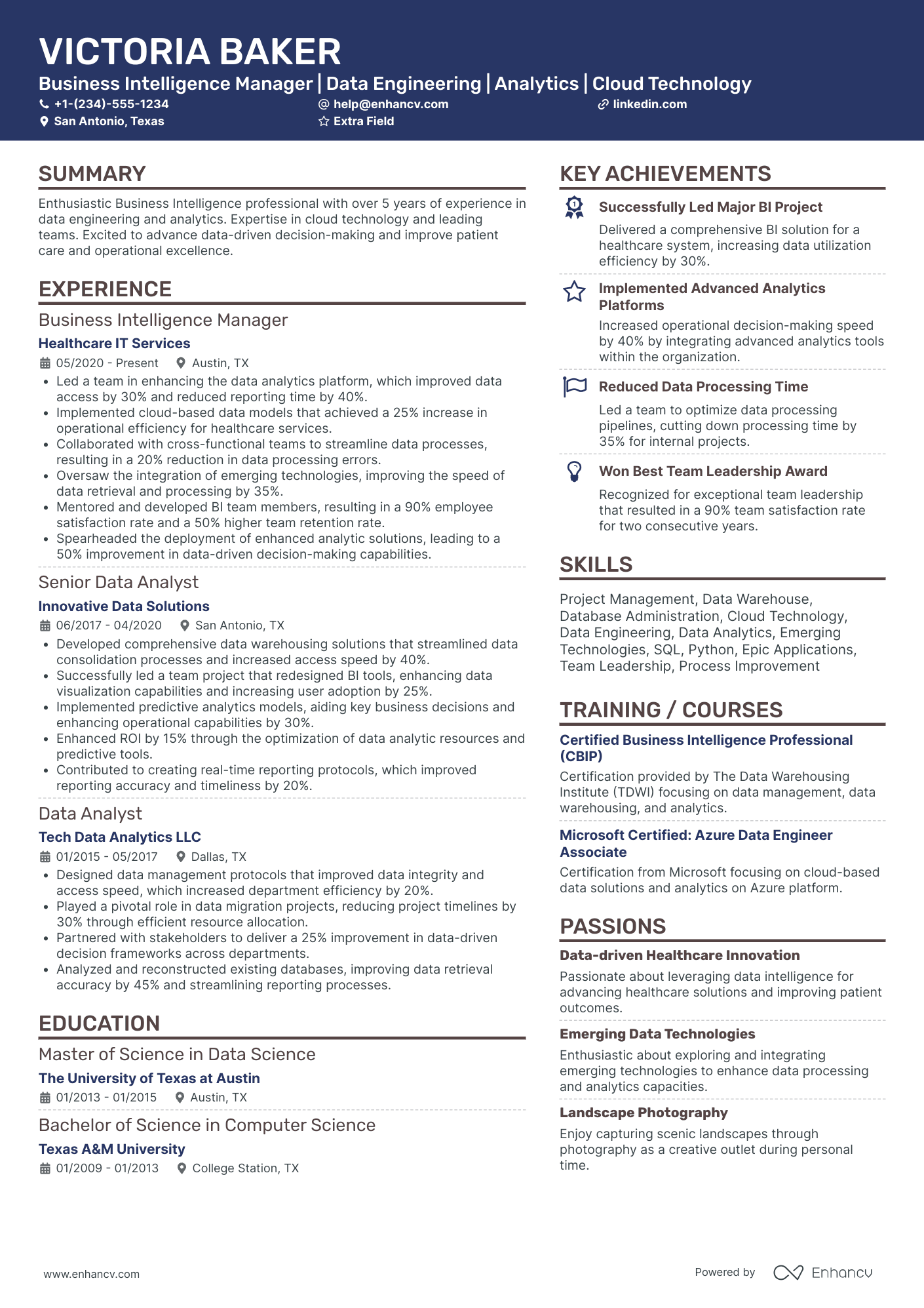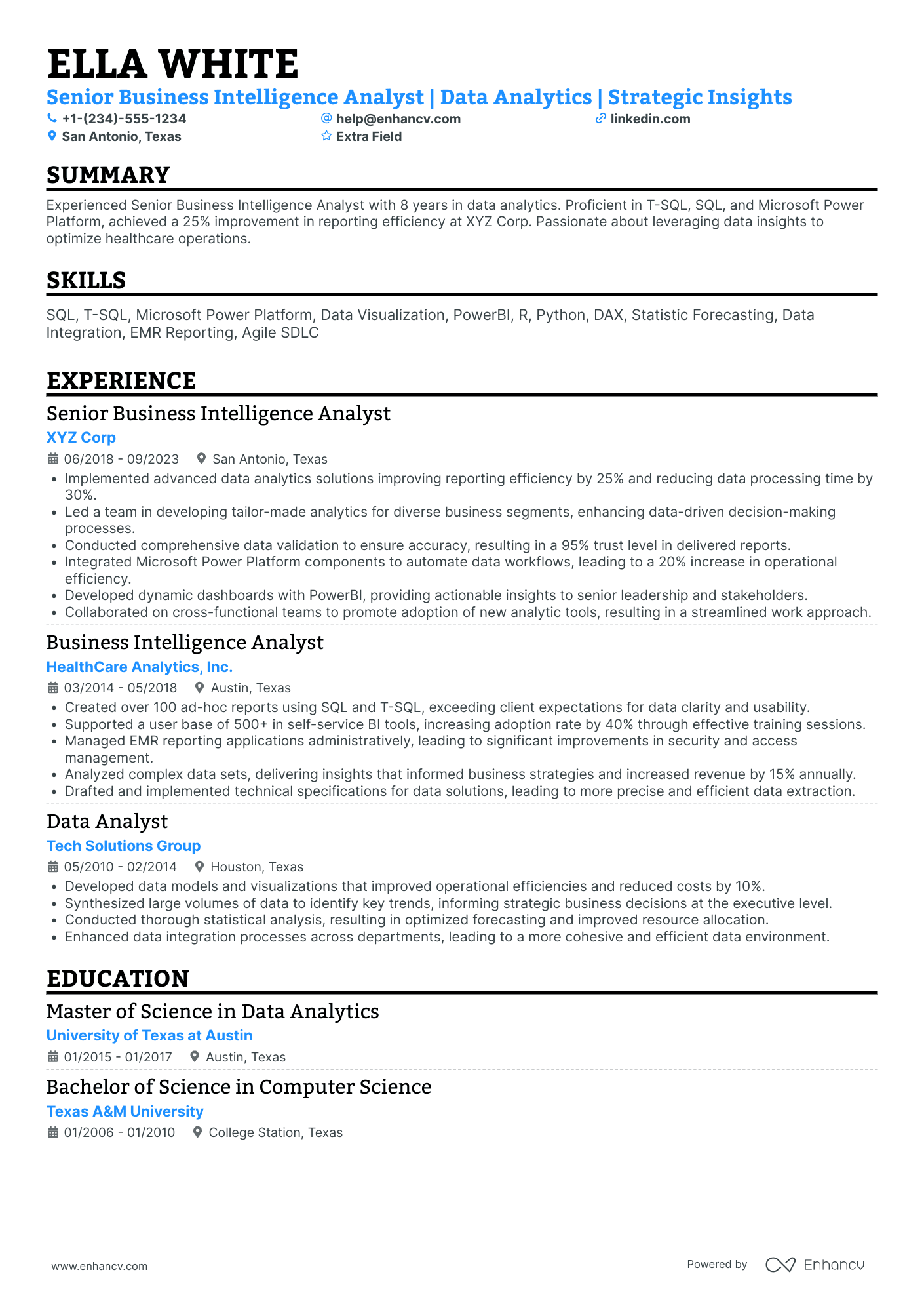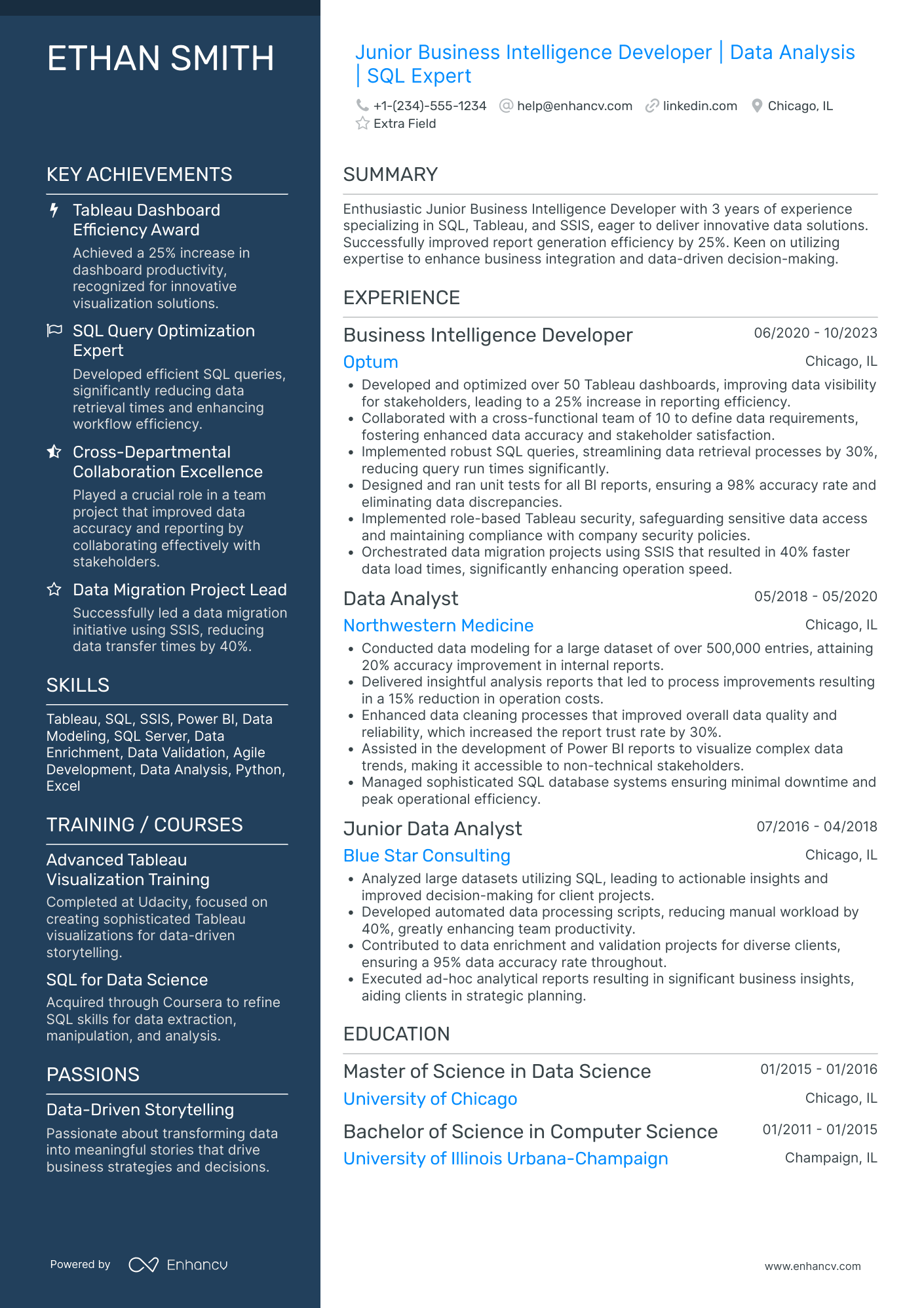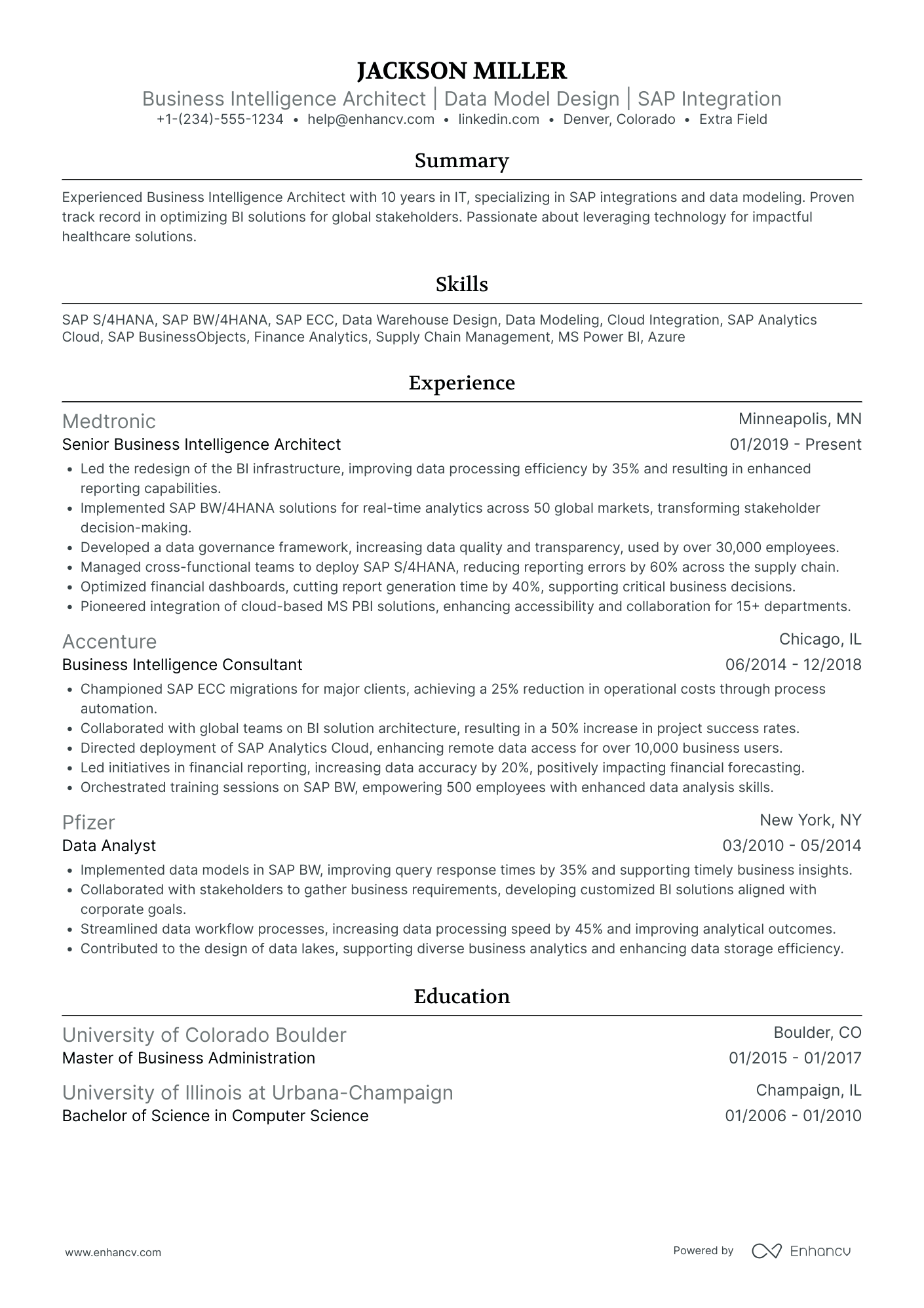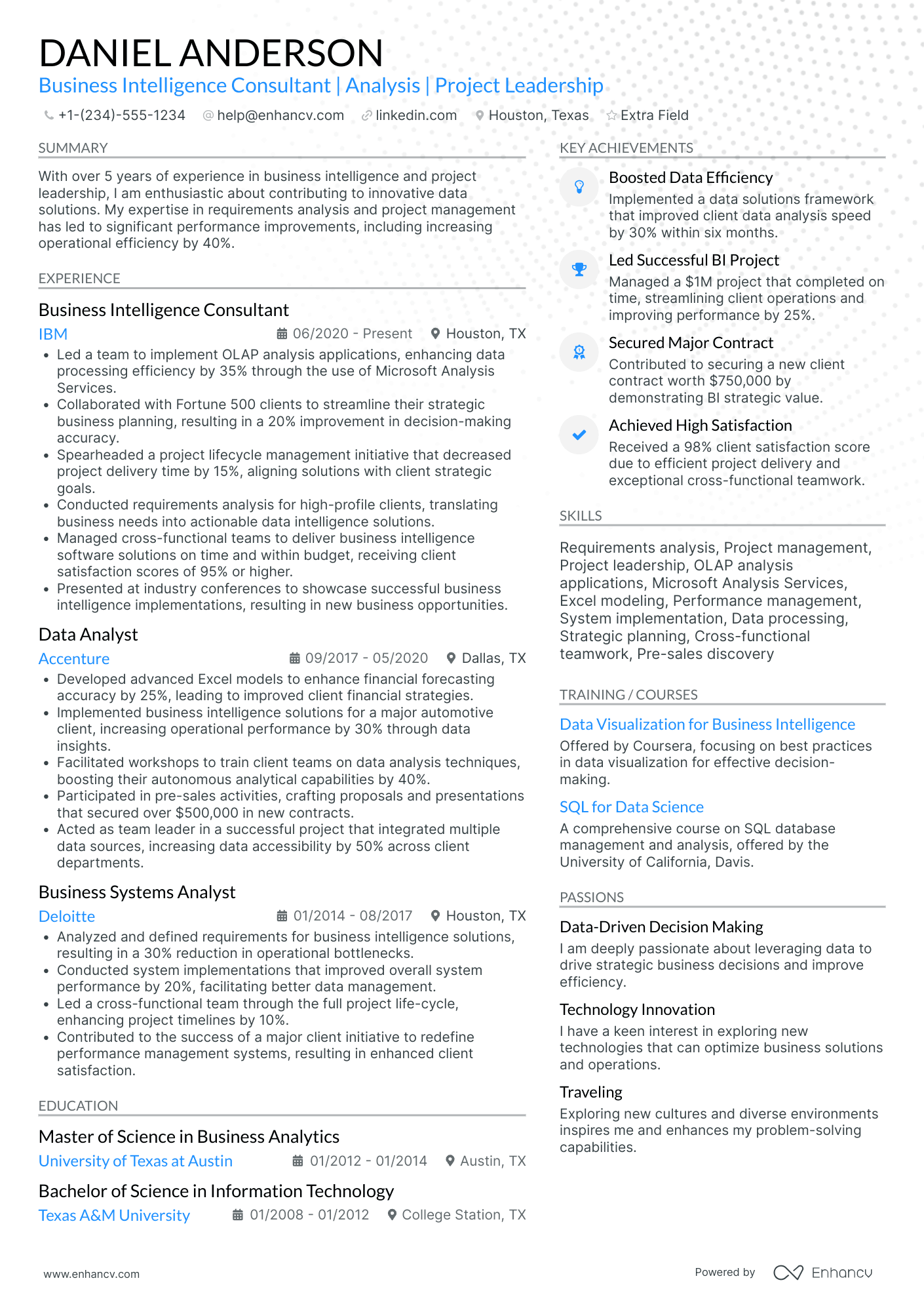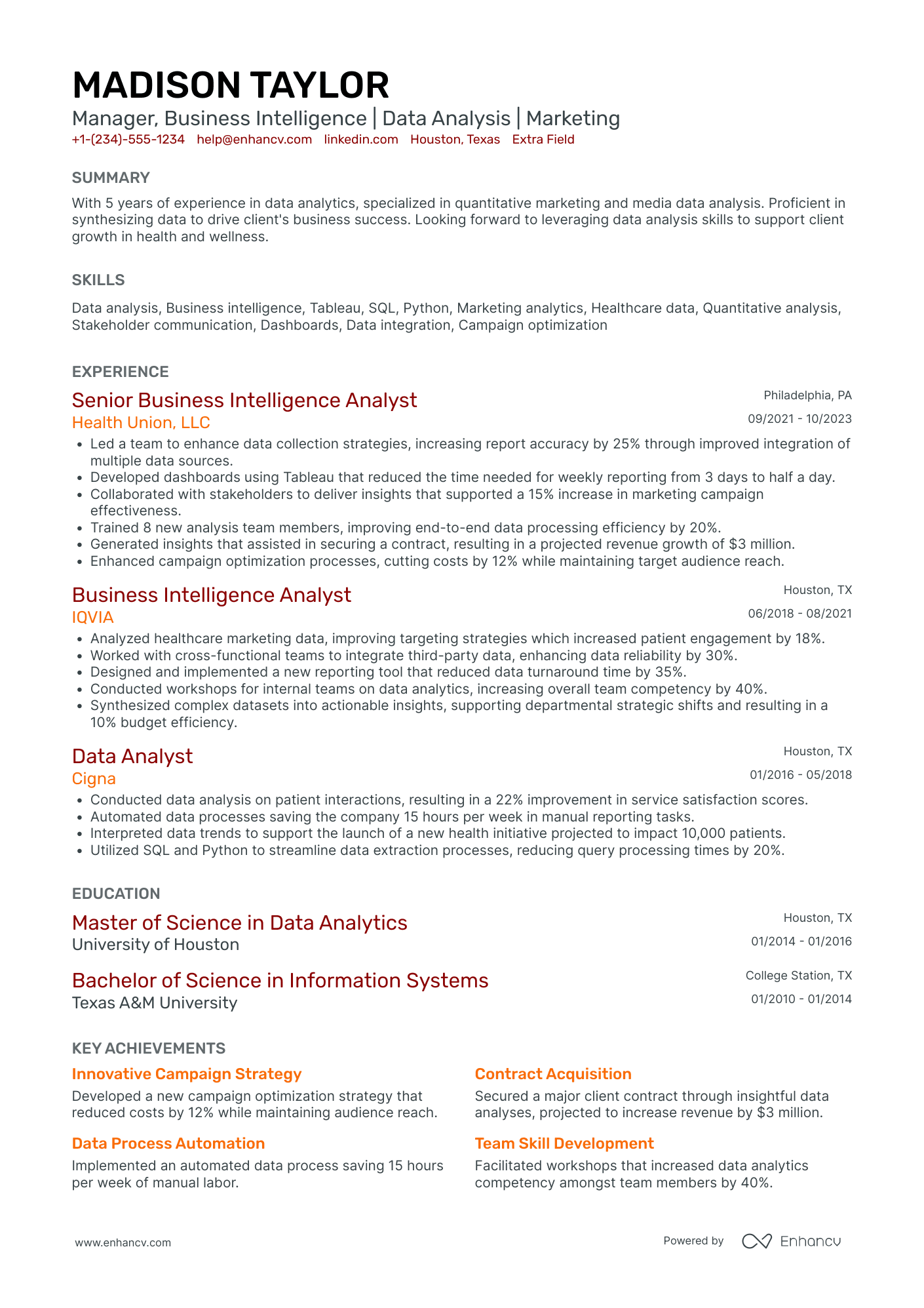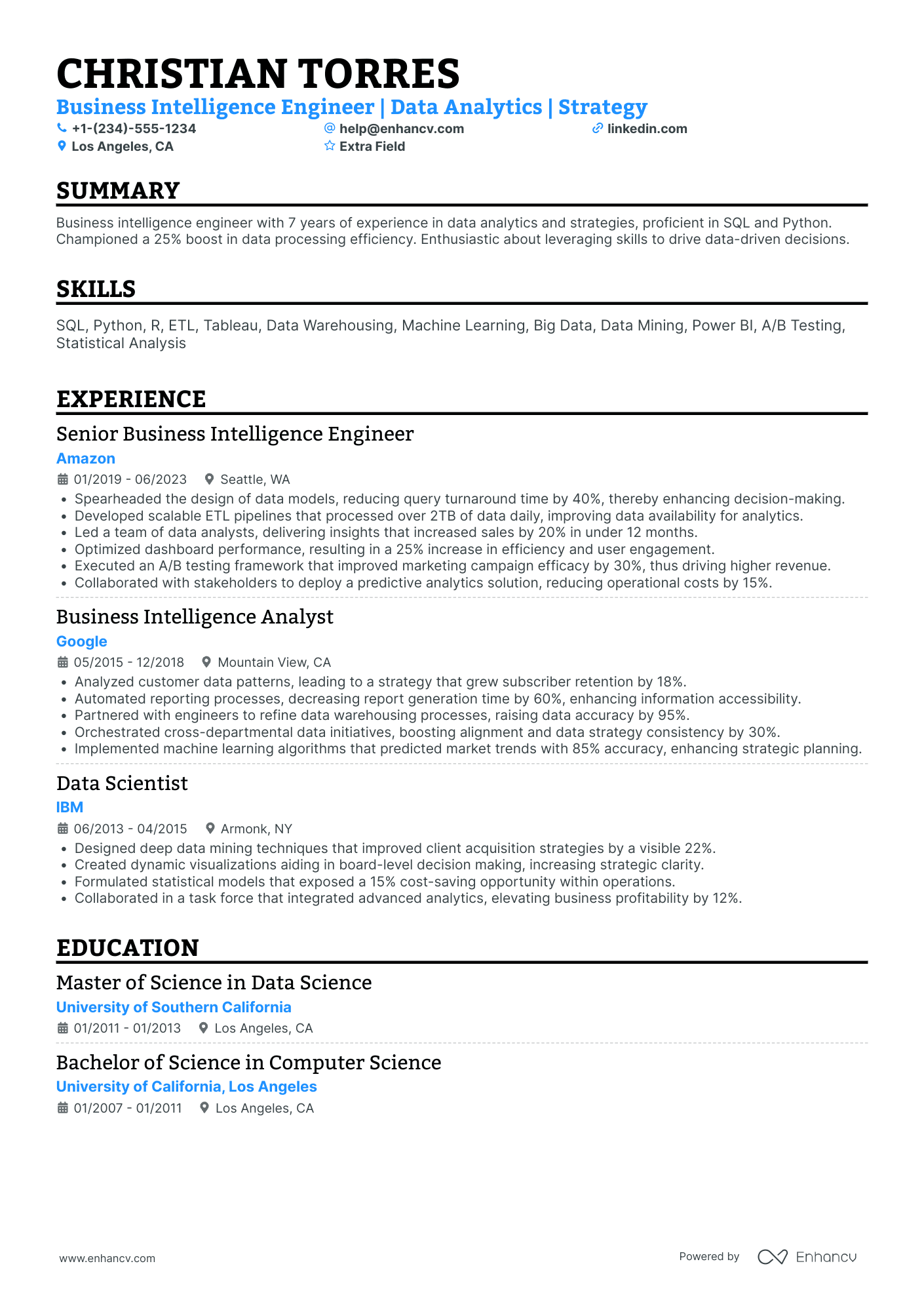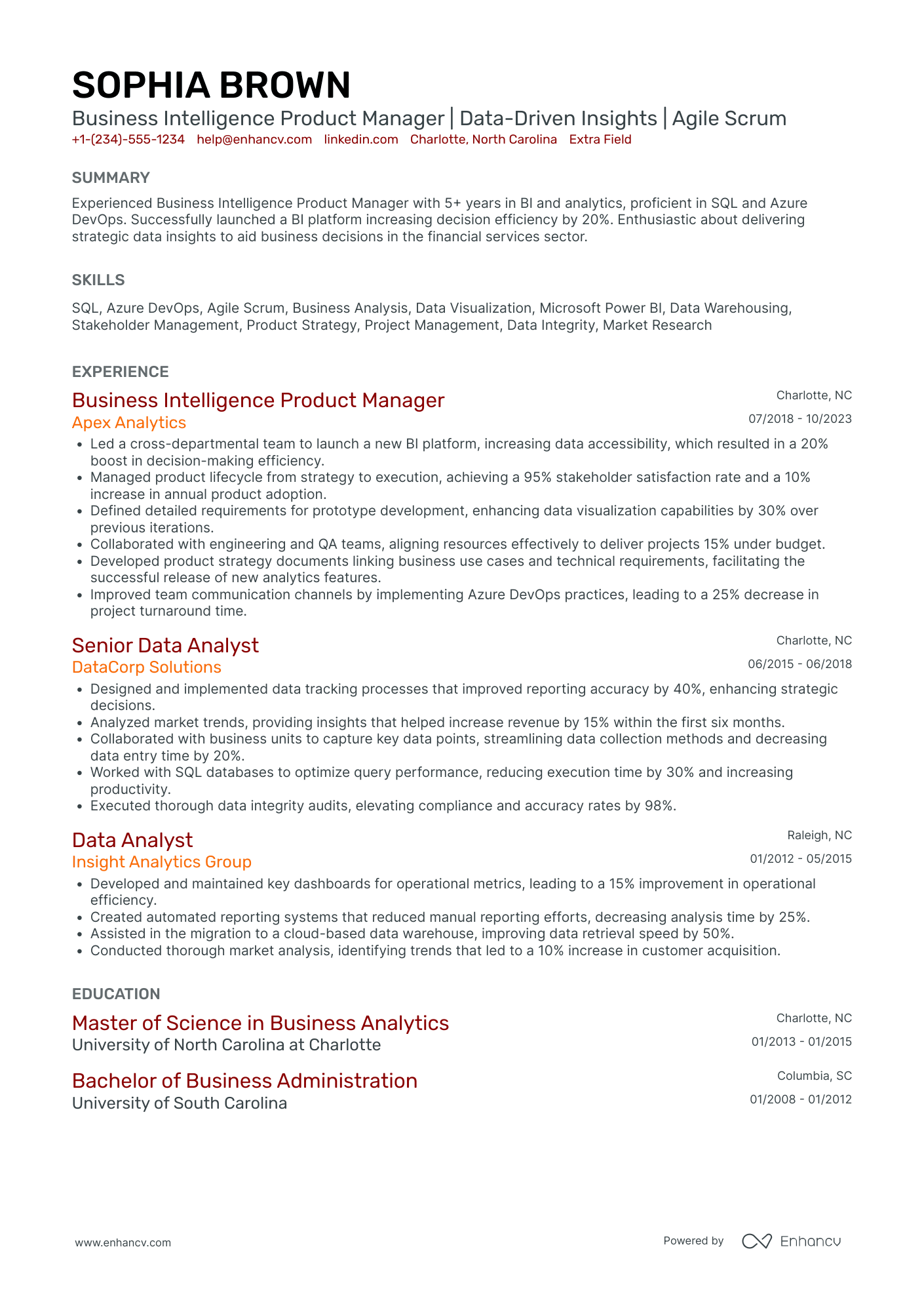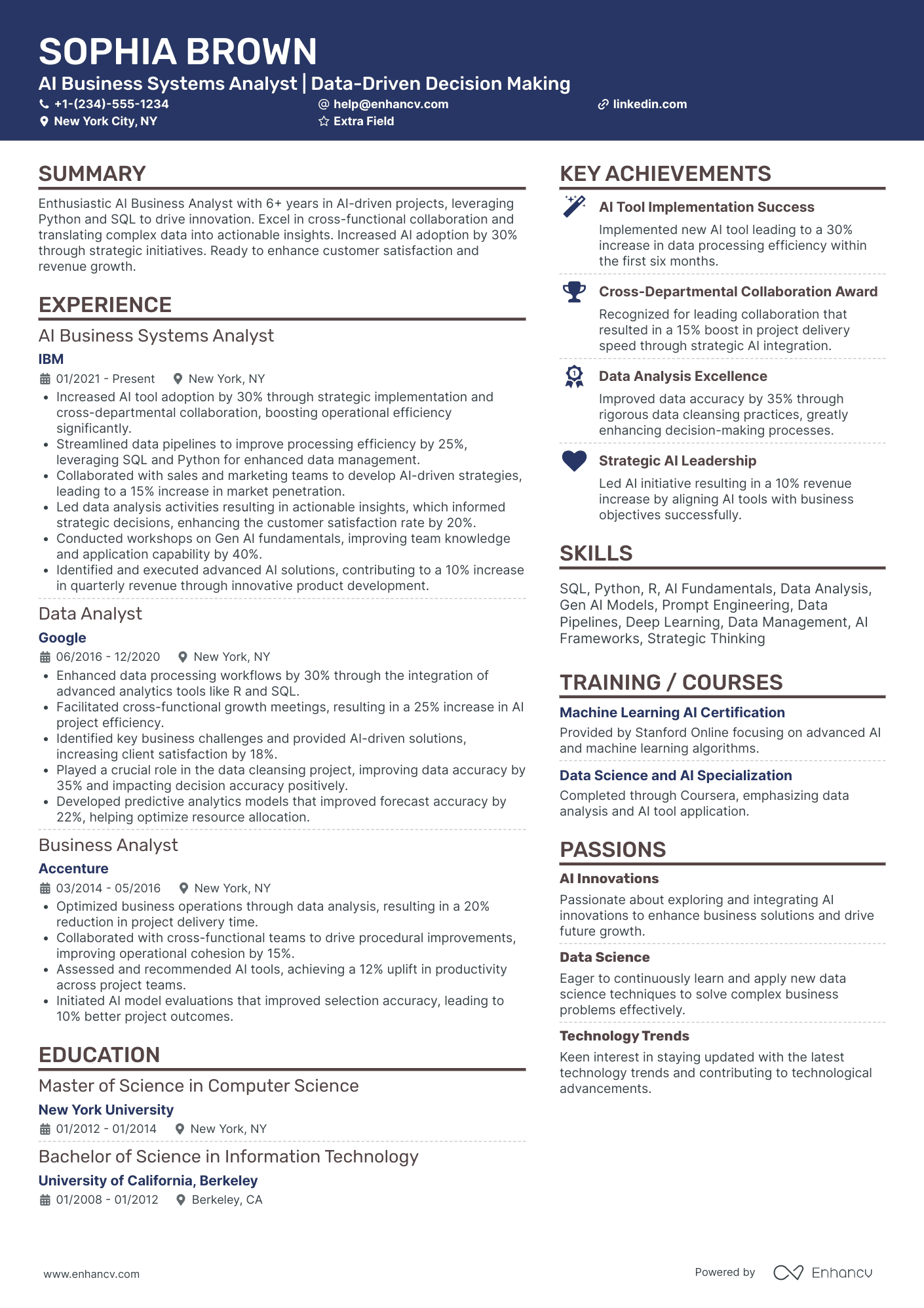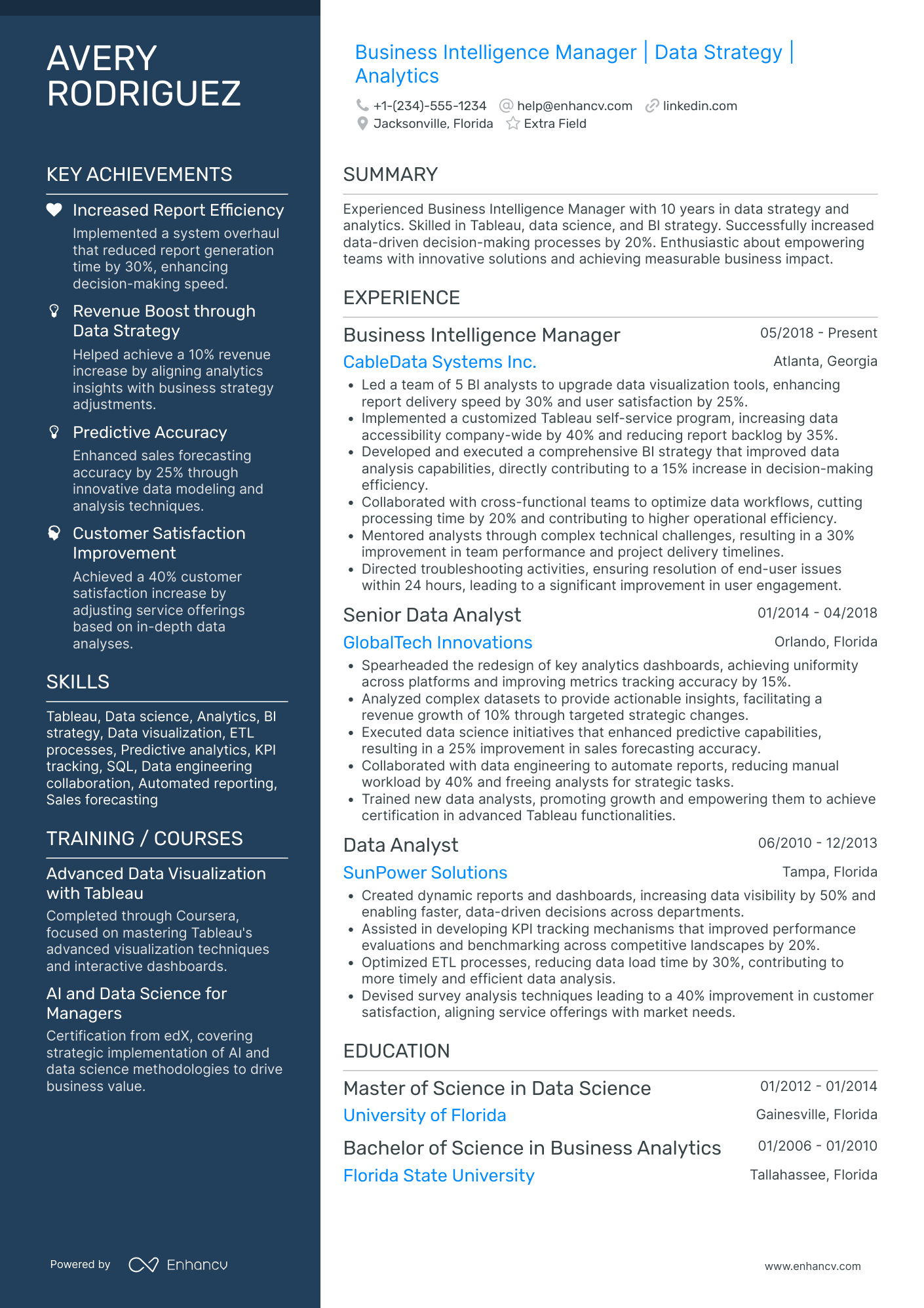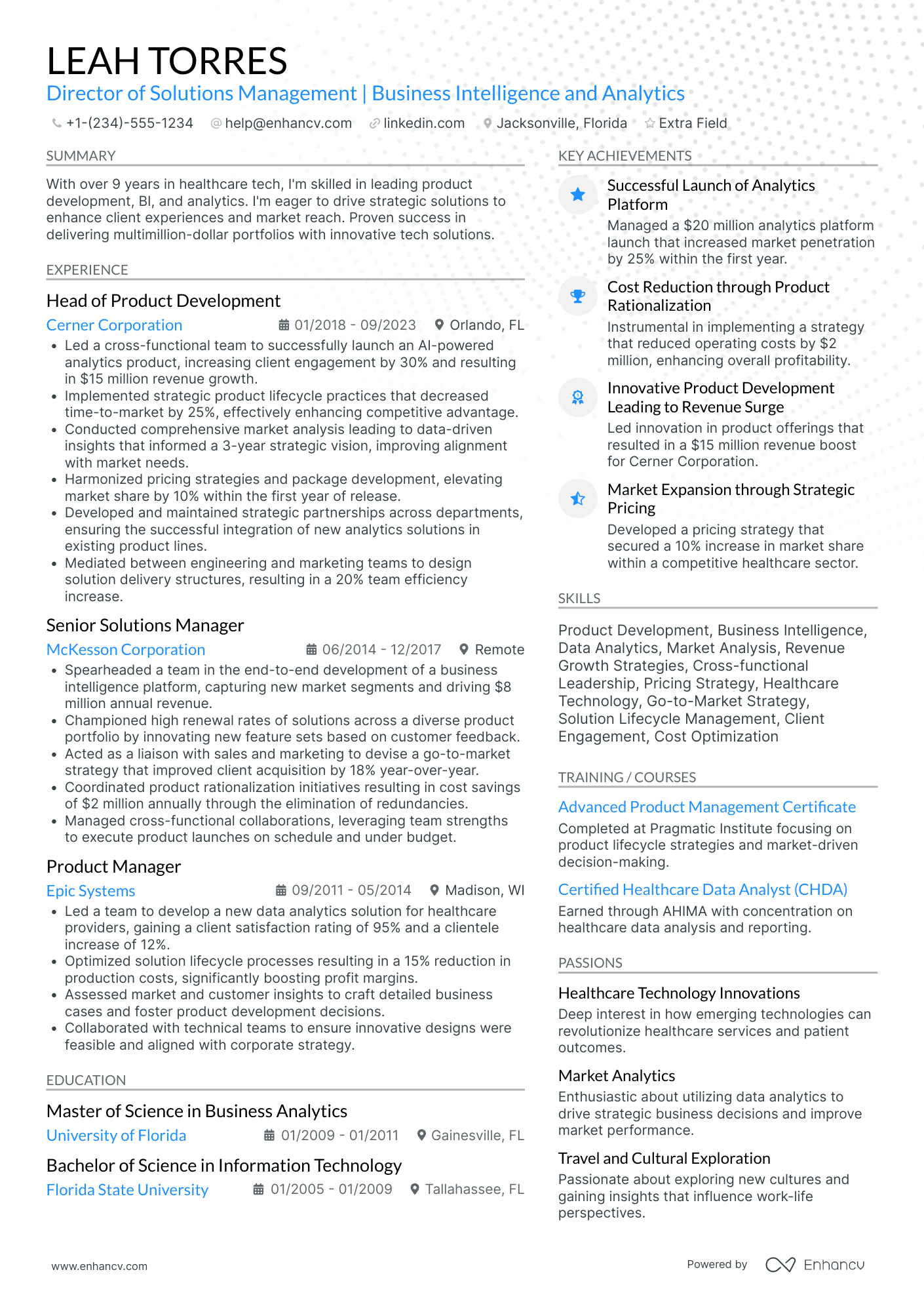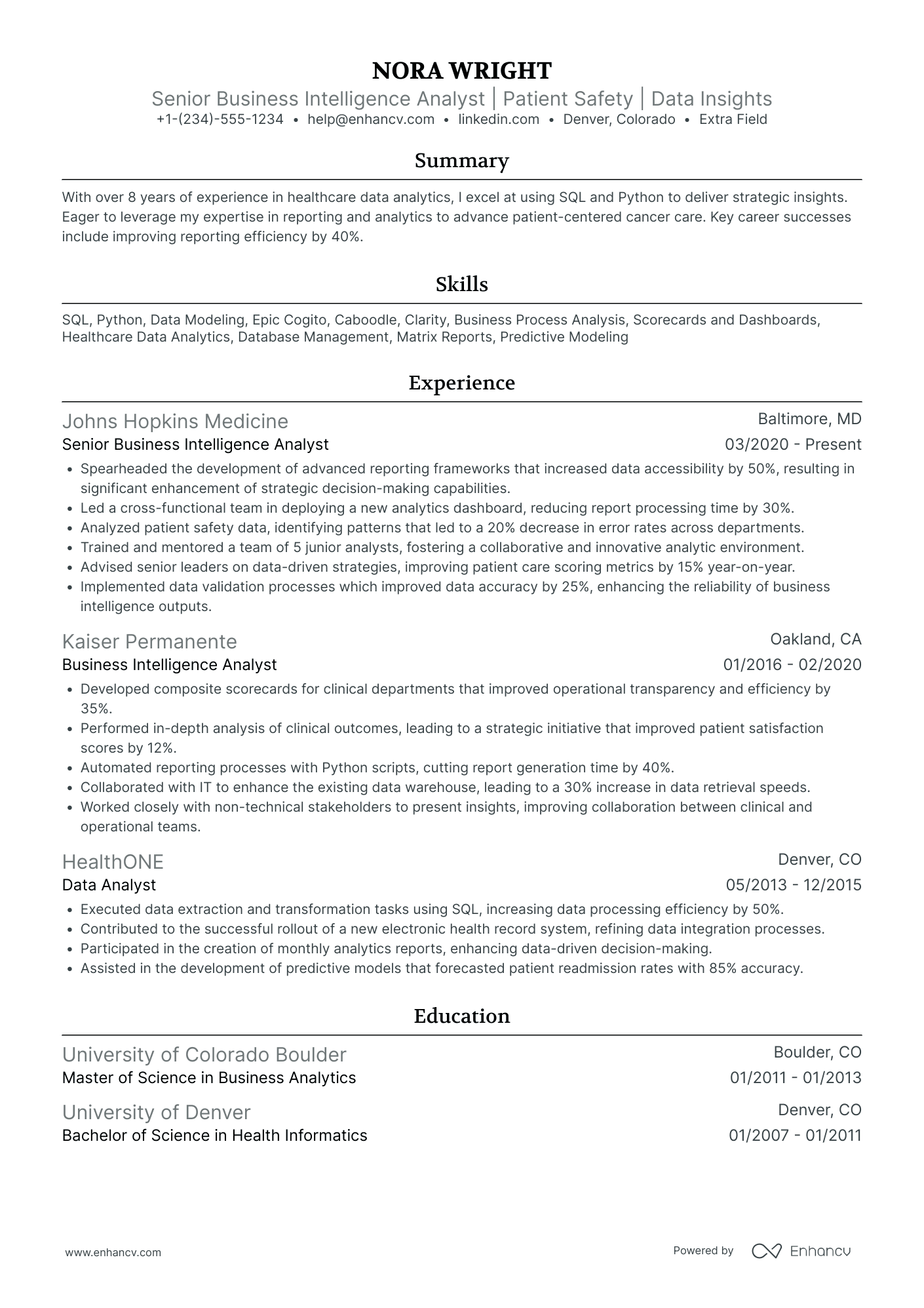Today’s business environment requires pairing your knowledge with robust analytical tools. As a BI specialist, you’re able to transform meaningful data into strategic decisions. Through the depth of knowledge, sometimes you know more about a business than the owners themselves!
With increasing complexity in data, businesses are now intensifying their demand for tailored BI solutions. As RIB Software notes, “Businesses are no longer wondering if visualizations improve analyses but what the best way to tell each data story is, especially with the help of modern BI dashboard software.”
This shift underscores the vital role BI specialists play in shaping the future of data-driven decision-making. Learn how to create an outstanding business intelligence resume with our comprehensive guide.
Key takeaways
- Present your strengths and accomplishments through a clear template with legible fonts and subtle colors.
- Use a reverse-chronological format to outline your career progression in business intelligence.
- Highlight your experience section with quantifiable achievements and tangible outcomes to quickly capture the attention of hiring managers.
- Include a dedicated section for business intelligence skills relevant to the niche you’re applying for, and integrate your interpersonal skills throughout your resume.
- A relevant educational background in business analytics, IT, or a related field is highly valuable and will be highly regarded in BI roles.
Let's delve into a specific resume sample to understand the practical application.
Business intelligence resume sample
Take a look at Layla’s resume for ideas on how to structure your own. You can copy it and replace the text with your information with the help of the Enhancv resume builder.
Layla Jones
business intelligence Analyst
layla.jones@bi-analyst.com | @LinkedIn | New York, NY
Summary
Accomplished business intelligence Analyst with over five years of experience in leveraging data to drive business solutions in diverse sectors, including finance and retail. Proficient in developing BI solutions, enhancing data-driven decision-making, and communicating complex findings to influence strategic plans. Known for improving operational efficiency by streamlining processes and implementing robust data analysis frameworks.
Experience
business intelligence Analyst
Goldman Sachs, New York, NY
June 2019 – Present
- Spearheaded the development and management of business intelligence solutions that increased the efficiency of financial reporting processes by 30%.
- Conducted detailed analysis of business requirements and effectively communicated actionable insights to management, leading to a 20% increase in operational efficiency.
- Collaborated with IT and management to ensure seamless data integration and reporting alignment with strategic objectives.
Business intelligence Specialist
Macy’s, New York, NY
May 2015 - June 2019
- Designed and delivered comprehensive reports and dashboards that enhanced the retail decision-making process, boosting sales performance analytics.
- Played a key role in a team that developed a new data collection strategy, which improved the accuracy of consumer behavior forecasting.
- Created and maintained extensive documentation that supported user training and system maintenance, reducing error rates by 25%.
Education
Master of Science in Business Analytics
New York University
Graduated: 2015
Bachelor of Science in Computer Science
Columbia University
Graduated: 2013
Certifications
- Certified business intelligence Professional (CBIP)
- Microsoft Certified: Data Analyst Associate
Skills
- Data analysis and visualization tools (Power BI, Tableau)
- SQL and database management
- Project management
- Statistical analysis (R, Python)
- Process improvement techniques
Languages
- English (Native)
- Spanish (Professional Proficiency)
Now that you've seen a sample, let's discuss how to effectively format your own resume for maximum impact.
How to format a business intelligence resume
Business intelligence specialists understand the importance of presenting information in a visually pleasing way. So, when formatting your resume, use a template that will resonate with your goals and qualifications. Consider the market you’re applying to — for example, a Canadian resume would follow a different layout.
No matter which type you choose—a simple, traditional, or modern one—start by outlining the top sections on a resume:
The layout of a resume can differ by region – Canadian resumes may use a distinct format.
- Professional summary
- Work experience
- Education and certifications
- Technical skills
- Projects and accomplishments
We’ll break down each section below.
Resume format
The right resume format will demonstrate your analytical mindset and ability to present key information effectively. Select a clear, organized template to present your data analysis and reporting skills. Hiring managers will value a well-structured layout that aligns with industry standards.
Opt for the classic reverse-chronological format. It's widely recognized and offers a comprehensive view of your professional journey, emphasizing your dedication and consistency in driving results.
Resume designs
Use your data visualization skills to build a thoughtful resume design.
- Recruiters often have limited time, so keep your resume focused and concise. A one-page resume provides a clear overview of your key qualifications.
- Avoid overcrowding your resume. Maintain margins between 0.5” and 1”, ideally leaning towards the higher end to ensure readability.
- Using a two-column design can help you maximize space, allowing you to present more information without making the document too lengthy.
- Don’t hesitate to use subtle colors to enhance the professional appeal of your resume. Consider refined shades like dark gray, blue, or green. Pair them with a modern, clean font such as Rubik, Calibri, or Lato to give your resume a distinct look.
Contact information
The header on top of your resume should include essential contact information, such as your name, job title, and email address. Photos are generally not required for positions in BI.
Always include your LinkedIn profile to show potential employers you’re well-connected and your ideas reach a wide audience.
Another way to show your achievements is through a professional portfolio. Include a QR or a simple link to it in your header.
File formatting
Use a PDF to keep all your resume elements in place. A clear naming convention, like John_Green_BusinessIntelligenceSpecialist will save recruiters precious time.
PRO TIP
Applicant Tracking Systems often cause unnecessary fear. Contrary to popular belief, our tests showed that fonts, colors, columns, and resume length don’t affect parsing. Focus on matching job description language and formatting details like dates and bullet symbols as those may affect your application. However, not all companies use ATS, so avoid keyword stuffing and keep your resume clear and readable.
Make sure your resume has no typos to further enhance your detail-oriented profile. Our free resume checker ensures your document meets industry standards.
Is your resume good enough?
Drop your resume here or choose a file. PDF & DOCX only. Max 2MB file size.
Moving from the broad structure, we now focus on articulating your professional experiences clearly and compellingly.
How to write your business intelligence resume experience
As a business intelligence specialist, you’re the bridge between a lot of business data and industry-specific intelligence. On the work arena, you turn data into meaningful insights. Try to apply this know-how to your work experience section. Reflect your achievements with specific examples that engage recruiters.
You’re not supposed to be as deeply knowledgeable as, say, a CFO with 20 years of experience in a very specific industry, but you need to know how to ask the right questions and drink from the firehose to quickly understand not just what your users want you to build, but more importantly why they need it and how they’re going to use it to conduct business.
Olivier Travers, on Business Intelligence job profiles
Let’s look at a real job posting. The highlighted parts have been targeted in the experience section below:
Business Analyst
The Business Analyst position touches a number of processes critical to the day-to-day operations of J&J Vision Canada. Primary responsibilities include the management of tailored pricing programs, field sales quota calculation and deployment, quarterly commission calculations, and maintaining sales tools used daily by field sales and the management team. In addition, the Business Analyst must possess the strong ability to conduct root cause analysis delivering key insights by brand, channel, region, and customer to drive business strategies in the organization. The individual will assume a leadership role in the creation of Customer Relationship Management (CRM) and Marketing Automation capabilities for J&J Vision, allowing us to individually tailor our marketing message to each patient throughout the sales cycle.
Key responsibilities
- Maintain key reports and processes that drive decisions on overall strategy, investment, customer-facing programs, sales targets, and compensation.
- Prepare and analyze weekly/monthly reporting on business sales results (by brand, channel, region, etc.), clearly identifying key trends, insights, and opportunities.
- Prepare and analyze quarterly and annual reporting on market data (Market Share data, rebate redemption) pulling out key insights.
- Management of our key customer discount program tracking quarterly, by-customer target achievement, and assigning the appropriate pricing for the following quarter. Also responsible for the annual deployment, tracking, and archiving of customer contracts (via external relationship with DocuSign), and the deployment of monthly + quarterly e-mail statements to program participants.
- Quarterly deployment of national, by-customer growth targets down to the territory level.
- Quarterly Field Sales and Key Account Manager commission calculations.
Collaborate with broader team for analytic needs
- Support the Sales and Management team to prepare ad hoc reports and analysis.
- Collaborate with the Strategic Accounts team to discuss sales trending and account initiative impact on sales.
- Collaborate with Finance to discuss business results and forecasting requirements.
Qualifications
- Bachelor’s degree, in finance, accounting, business, mathematics, or statistics.
- A minimum of three years of professional analytical experience is a requirement; this includes problem identification, data-gathering, analysis, solution, and implementation.
- Demonstrates strong data management and analytical skills and the ability to communicate complex issues and solutions.
- In-depth knowledge of report creation and maintenance in Tableau.
- Track record of creating and implementing key process improvements.
- Ability/experience to conduct formal and ad-hoc presentations to cross-functional partners.
- Cultivates new insights, challenges the status quo, and sees the possibilities.
- Optimally communicates across all levels—both in writing & verbally.
Tailoring your resume to the job posting
A foolproof strategy when creating your resume is tailoring it to the job you’re applying for. Use keywords mentioned in the job description, so that recruiters can quickly see you fit the profile they’re looking for.
BI specialists can sometimes be tempted to list each and every job they’ve held—and while we’re sure they all offer some value, this approach can result in overly lengthy resume that seem unfocused.
Now let’s put theory to practice with this example experience entry:
- •Developed and managed tailored pricing programs, achieving a 15% increase in sales quota fulfillment through optimized sales strategies and commission structures.
- •Led the quarterly and annual sales commission calculations and maintained CRM and Marketing Automation tools, resulting in a 20% increase in marketing campaign efficiency.
- •Analyzed and reported on business sales results, identifying key trends and insights by brand, channel, and region that led to a 10% increase in strategic decision accuracy.
- •Managed a customer discount program, increasing customer retention by 25% through effective quarterly pricing adjustments and contract management.
- •Collaborated with Strategic Accounts and Finance teams to evaluate sales trends and forecast business results, contributing to a 30% improvement in financial planning accuracy.
- •Implemented key process improvements in data management and analytics using Tableau, which enhanced report creation and maintenance, reducing reporting errors by 40%.
Here’s what makes it effective:
- Each bullet point directly addresses responsibilities listed in the job description.
- The inclusion of percentages in the bullet points emphasizes measurable impacts.
- The bullets highlight specific skills like data analysis, strategic planning, and process improvement, which are critical for a business analyst role.
With your experiences outlined, it's crucial to quantify these accomplishments to showcase your impact effectively.
How to quantify your experience on resume
Quantifying achievements on your resume as a BI specialist is vital as it provides concrete evidence of your impact and value to potential employers. By presenting specific metrics or results achieved through your initiatives you clearly demonstrate how your analytical skills have directly contributed to business success.
Here are some ideas:
- Share your experience in identifying, developing, and tracking KPIs which have led to business growth.
- Mention the amount of raw data you have converted into easy-to-understand formats which assisted decision-making processes.
- Share cases where you have rectified flawed data points that significantly improved data quality.
- Include information about your strategies or analysis that led to a tangible return on investment.
- Share your experience in creating or optimizing data models which improved data consistency and efficiency.
If your experience is limited, fear not–let's explore how you can still create an appealing resume.
How do i write a business intelligence resume with no experience
When creating a BI resume without direct experience, consider using a hybrid resume format that highlights both your skills and educational background.
Here’s how you can break down the process:
- Start with a strong objective statement to outline your goals and relevance to the role.
- Follow it with a detailed skills section featuring both technical proficiencies (like SQL and Excel) and soft skills essential for data analysis.
- Include any relevant coursework, certifications, and projects demonstrating your ability to apply BI tools and methodologies. Projects should be described with clear outcomes to underline your practical experience.
- Emphasize any academic or volunteer experiences where analytical skills were utilized, even if they weren't directly related to BI.
- Wrap it all up in a modern resume template to hint at your fresh ideas and insights.
PRO TIP
To further prepare for the interview process and the job itself, you can go through video case studies of Adaptive Insights and Anaplan, one Reddit user suggests. These demonstrate how BI is used to solve business problems; plan and forecast.
Take a look at this well-written BI resume objective:
What’s great about it is it emphasizes the candidate's relevant Master's degree and specialized skills in Microsoft Power BI and data modeling. It highlights a proactive eagerness to learn and adapt, aligning with the company's values of creativity and enthusiasm.
Moving on from experience, let’s tackle the essential hard and soft skills that employers value.
Business intelligence skills on your resume
When it comes to your skills section, don’t look for the perfect answer. Instead, think strategically–what are the best skills for the job you’re applying for, and build your skill set with intent.
Technical proficiency in the top BI programs is the basis of business intelligence. You use technologies to build queries, extract data and communicate your findings with a large team. Combined with industry knowledge and critical thinking, you’re the guru for understanding data.
BI is a varied and expansive field, with many different areas to focus on or specialize in. This variety affords a great deal of career flexibility without the need to completely shift your areas of expertise or skill set.
Sandra Durcevic, Data Pipe
Show off your technical skills to add credibility to your application—here’s a list of the most common ones:
Best hard skills for your business intelligence resume
- Power BI
- Tableau
- QlikView
- Microsoft Excel
- Google Analytics
- SAS business intelligence
- Oracle business intelligence
- ThoughtSpot
- Looker
- SAP BusinessObjects
- IBM Cognos Analytics
- Microsoft SQL Server
- MySQL
- Oracle Database
- R Programming
- Python
- Apache Hadoop
- Apache Spark
- Predictive Modeling
- Alteryx
- DAX
People skills are just as important on your BI resume. After all, as brilliant as you might be with data, communicating it comprehensively is what really counts.
Consider including these soft skills on your resume:
Best soft skills for your business intelligence resume
- Analytical thinking
- Problem-solving
- Attention to detail
- Communication skills
- Curiosity
- Creativity
- Project management
- Decision making
- Adaptability
- Teamwork
- Presentation skills
- Critical thinking
- Time management
- Leadership
- Ethical judgment
- Relationship building
- Consulting skills
- Continuous learning
- Strategic thought process
- Task prioritization
Having discussed skills, let’s consider the educational background and certifications that further bolster your qualifications.
How to list your certifications and education on your resume
As a BI specialist, a solid educational foundation is important. It shows depth of knowledge, consistency, and discipline, which are all paramount to your success.
Here are the top degrees that’ll enhance your BI application:
- Computer science
- Data science
- Business administration with a focus on information systems
- Statistics
- Information technology
And here’s what to include in a well-structured education section:
- A clearly outlined degree and major.
- Your educational institution.
- The year you graduated (the month is not required).
- Courses related to quality assurance or quality control.
- If you’ve been on the Dean's List, graduated Cum Laude, or received a scholarship, underline that on your application.
Certifications on a BI resume
Even if you’ve got a degree in another field, don’t fret. There are still plenty of opportunities to get the qualifications needed for a BI specialist. One way is through additional training or obtaining relevant certifications.
Here are our top picks:
Best certifications for your business intelligence resume
And now, let’s look at an education entry targeting the job ad above:
- •Focused on courses such as Advanced Statistical Theory, Business Analysis, and Financial Mathematics.
- •Awarded the Dean's Honor List for three consecutive years for outstanding academic performance.
- •Completed a capstone project on 'Predictive Analytics for Market Trends,' which aligns with real-time data analysis and strategic decision-making needs.
- •Developed strong expertise in business intelligence frameworks, data warehousing, and analytics strategies.
- •Certified knowledge in transforming business needs into analytics models and actionable insights.
This education section is well-structured, clearly presenting key details such as the degree, institution, and notable academic achievements. The inclusion of relevant coursework and a capstone project demonstrates the candidate's practical experience and subject expertise.
You might wonder if an MBA is worth it. Well, it certainly looks good on any resume, but you don’t really need it for most BI roles. Consider it if you’re interested in more senior or VP roles, but at individual contributor levels technical execution takes priority.
With your educational credentials outlined, let's encapsulate your professional persona in a compelling resume summary.
How to write your business intelligence resume summary
A compelling summary is an integral part of your BI resume. In just a few carefully curated sentences, you show potential employers what your strengths are and the specific ways you can help their business.
- Describe your professional journey in three to five sentences.
- Use data and numbers to show the exact ways in which you can be helpful.
- Enhance your competencies by adding relevant education or additional training.
Here’s the summary targeting the job description we discussed:
This resume summary stands out by succinctly blending specific achievements with quantifiable results. It highlights the candidate's continuous improvement and educational background. Clearly demonstrating how their skills can drive success, it makes them an attractive prospect for the role.
Finally, let's enhance your resume by including additional sections that reflect your unique qualifications and interests.
Optimize your resume summary and objective for ATS
Drop your resume here or choose a file.
PDF & DOCX only. Max 2MB file size.
Additional sections for a business intelligence resume
Optional sections on a resume can reveal valuable info about your personality and show who you are through personalization. As tempting as it might seem, especially with your AI prowess, avoid making your resume too generic by relying heavily on ChatGPT.
Consider adding these to your document:
- Projects: Detail key projects that showcase your ability to apply BI tools and methodologies in real-world scenarios, highlighting any business outcomes you influenced.
- Professional development: Show continuous learning by listing seminars, workshops, and courses taken that are relevant to business intelligence and data analytics.
- Conferences and public speaking: Mention your participation in key industry conferences, either as an attendee or speaker, which can demonstrate your active involvement in the BI community.
- Languages: Include languages you speak fluently, especially if the job involves working with international teams or datasets in multiple languages, enhancing communication and collaboration capabilities.
In conclusion
Picture your business intelligence resume as a well-organized dashboard, designed to display your expertise in data visualization and analytics. This guide will help you arrange your technical skills and data-driven achievements like clear, compelling charts, making it easy for potential employers to see your value at a glance.
Business Intelligence resume examples
By Experience
By Role
